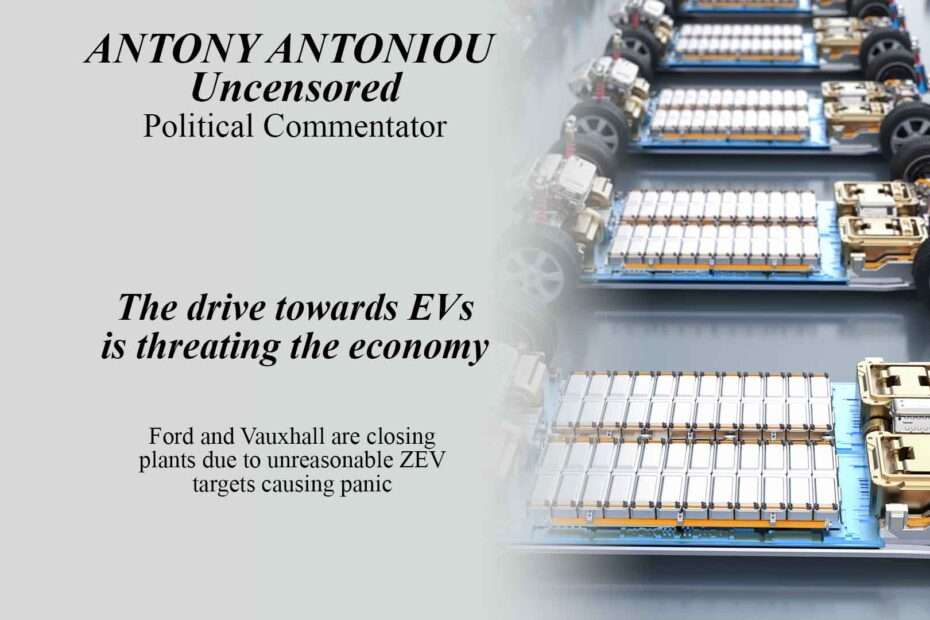The drive towards EVs is threatening the economy
Electric Vehicle Manufacturing in the United Kingdom: A Sector Under Significant Strain
The British automotive industry is experiencing a pronounced downturn, with electric vehicle (EV) production facing unprecedented challenges that are sending shockwaves through the manufacturing sector. Recent data from the Society of Motor Manufacturers and Traders (SMMT) reveals a stark decline in car production, highlighting the intense pressures confronting manufacturers during this critical transition period.
Production Decline and Market Dynamics
In October, overall car production plummeted by over 15% compared to the same period last year, primarily attributed to a substantial reduction in export volumes and weakening international demand. The most striking statistic is the one-third decline in electric and hybrid vehicle production, a figure that underscores the sector’s current volatility.
The challenges are not merely statistical but have tangible human and industrial consequences. Major automotive manufacturers are making difficult strategic decisions that are reshaping the landscape of UK manufacturing. Stellantis, the parent company of Vauxhall, has announced the closure of its Luton van-making factory, a move that puts 1,100 jobs at immediate risk. Similarly, Ford has declared plans to cut 800 jobs over the next three years, citing challenging trading conditions and diminished electric vehicle demand.
Industry Leadership Speaks Out
Mike Hawes, the SMMT’s chief executive, has been unequivocal about the sector’s predicament. “These are deeply concerning times for the automotive industry,” he stated, emphasising the “massive investments in plants and new zero emission products” that are currently under intense scrutiny.
The global context is equally complex. While worldwide EV demand has experienced a slowdown, the UK faces unique challenges. Manufacturers are grappling with what Hawes describes as “the toughest targets and most accelerated timeline” without sufficient customer incentives to drive market adoption.
Regulatory Landscape and Government Intervention
The UK’s Zero Emissions Vehicle (ZEV) mandate represents a critical regulatory framework in this transition. From 2024, manufacturers are required to ensure that 22% of their car sales and 10% of van sales are zero-emission vehicles, with these targets set to increase progressively. Non-compliance carries significant financial penalties, including a £15,000 fine for each sale outside the mandate.
Business Secretary Jonathan Reynolds has acknowledged the industry’s concerns, promising a “fast track” consultation on how these EV targets will be enforced. Simultaneously, the government remains committed to the 2030 phase-out of new petrol and diesel vehicle sales.
The Department for Business and Trade has emphasised its commitment, highlighting investments of £2 billion in car manufacturing and over £300 million to support electric vehicle uptake.
Perspectives from Industry Insiders
Mark Noble, the former UK manufacturing lead for Stellantis, provided a candid assessment of the challenges. He pointed to multiple external factors impacting UK manufacturing, including Brexit-related uncertainties and tariff complexities that have particularly affected plants with high export ratios.
Charging Infrastructure: A Critical Consideration
The transition to electric vehicles is not solely about manufacturing but also infrastructure. While some industry voices highlight charging infrastructure limitations, Vicky Read from Charge UK offers a more optimistic perspective, noting that a new charging point is being installed every 25 minutes.
Government figures support this narrative, revealing over 71,000 public charge points across the United Kingdom, with an average of 57 being added daily.
Expert Analysis and Future Outlook
Government adviser James Richardson from the Climate Change Committee offers a forward-looking perspective. He warns that traditional automotive companies risk being overtaken by new competitors if they do not adapt quickly to the rapidly evolving market.
The electric vehicle sales targets, according to Richardson, are crucial in signalling the urgent need for manufacturers to innovate or risk market marginalisation.
Conclusion
The UK’s automotive sector stands at a critical juncture. The transition to electric vehicles presents both significant challenges and unprecedented opportunities. While the current landscape appears turbulent, with production declines and job uncertainties, the underlying commitment to sustainable transportation remains resolute.
As manufacturers, policymakers, and industry stakeholders continue to navigate this complex terrain, the coming months and years will be pivotal in determining the United Kingdom’s role in the global electric vehicle revolution.

